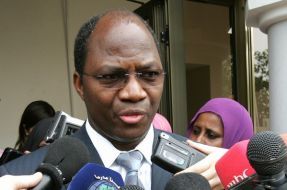Egypt FM, Joint Mediator discuss ways to reach peace in Darfur
August 26, 2009 (CAIRO) — The Egyptian foreign minister Ahmed Aboul Gheit briefed today Darfur joint mediator, Djibril Bassole on Cairo efforts to unify rebel groups in order to end the six-year conflict in western Sudan region.

“Aboul Gheit detailed during the meeting, the Egyptian contacts with various parties, including Darfur factions that participated in a gathering held in Cairo last July, or regional and international parties that participated in the quartet consultative meeting, which took place on August 23,” said Hisam Zaki, the spokesperson of the Egyptian foreign ministry in a statement released today.
He further said that the quartet meeting stressed the need to deal with Darfur crisis within a comprehensive perspective addressing the different aspects of the conflict and through the coordination of regional and international efforts to unite the factions. The meeting further discussed ways to achieve stability in the restive region, including the Chadian-Sudanese reconciliation, Zaki added.
Egypt which considers political stability in Sudan as national security issue had been angered by Qatari facilitators who avoided Egypt in their contacts despite the fact that it is a member of African Arab body supposed to support the mediation.
The two countries diverge on the handing of the Palestinian dossier and the Arab relations with Iran. So, Egypt during the last months was seeking to have an active role to play in Darfur peace process.
Bassole in press statements made in Cairo today following the meeting stressed the importance of the role of neighboring countries in order to encourage rebel groups to join the peace process, and “wished every success to these efforts.”
The Joint Mediator admitted that there are some rebel movements who are still reluctant to take part in the Doha process, but wished they change their position and join Darfur peace process, saying their participation is the only way to end the conflict.
He also said that the solution of Darfur crisis should be comprehensive and not partial; however he added that this objective could be achieved through different phases.
Djibril was alluding to the existence of different demands of the rebel groups, so to settle the conflict the mediation can handle separately these claims and to gather the rebel movements with the Sudanese government in the final phase.
JEM considers the solution of the conflict should be reached through the reshaping of the existing structures of the Sudanese state in order to give large autonomy to the regional entities and the equal sharing of national wealth.
The SLM of Abdel Wahid Al-Nur urges in a first phase to settle security problems and to render the fertile land currently controlled by Arab tribes to the displaced IDPs who are the real owners. The group also says the peace process has to create one region in Darfur, and to establish a secular Sudanese state based on the “equal citizenship rights principle”.
(ST)

Garang Arok
Egypt FM, Joint Mediator discuss ways to reach peace in Darfur
EGYPT IS NOT A PEACE BROKER BUT THE GHOST BEHIND ALL SUDANESE PROBLEMS.
In five thousand years Egypt[kemet] has ever kept her eyes and all attention in sudan politics for only one clear selfish reason;THE NILE WATER.
The are time Egypt will forward a comprehensive apology to the sudanese but it is going to be too late,
because there are consumable reasons close enough on pay day.